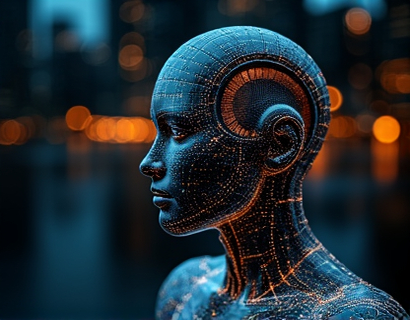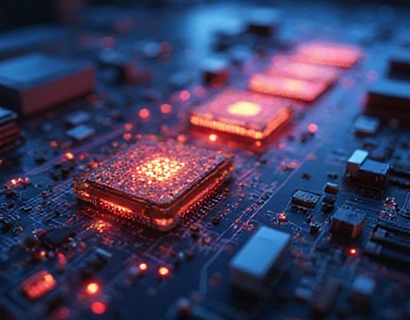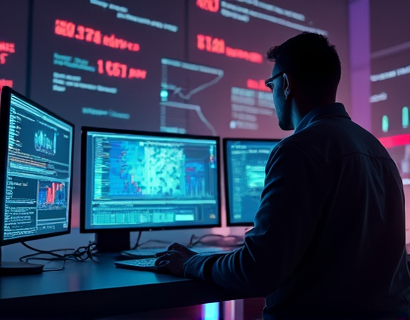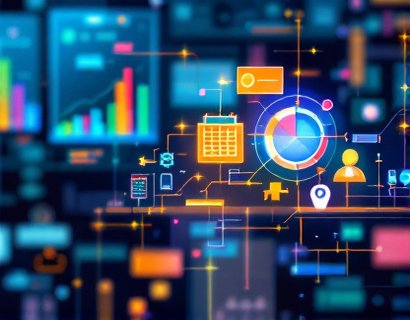AI and Crypto: Powering the Future of Digital Transformation with Enhanced User Experiences
The intersection of artificial intelligence (AI) and cryptocurrency is a fertile ground for innovation, promising to redefine digital experiences and drive significant advancements in technology. This fusion leverages the strengths of both domains to create more secure, efficient, and user-friendly digital solutions. As we delve into this topic, it's essential to understand the foundational roles that AI and cryptocurrency play individually, and how their convergence can lead to transformative outcomes.
Artificial intelligence, characterized by its ability to simulate human intelligence processes such as learning, reasoning, and self-correction, has been rapidly advancing over the past decade. AI technologies, including machine learning, natural language processing, and computer vision, have found applications across various industries, from healthcare to finance. These technologies enhance user experiences by providing personalized recommendations, automating routine tasks, and offering insights through data analysis.
Cryptocurrency, on the other hand, represents a decentralized digital currency that uses cryptography for security and operates on a distributed ledger technology known as blockchain. Bitcoin, the first and most well-known cryptocurrency, paved the way for thousands of alternative coins and tokens, each with unique features and use cases. Beyond being a medium of exchange, cryptocurrencies enable new forms of digital ownership, governance, and value transfer, challenging traditional financial systems.
The combination of AI and cryptocurrency can lead to enhanced user experiences in several ways. One of the primary benefits is the improvement of security. AI algorithms can detect and prevent fraudulent activities by analyzing patterns and anomalies in transaction data. This real-time monitoring and threat detection significantly reduce the risk of cyber attacks, providing users with a safer environment to conduct financial transactions.
Moreover, AI can optimize the user interface and experience on blockchain-based platforms. By analyzing user behavior and preferences, AI can tailor the interface to individual needs, making interactions more intuitive and efficient. For instance, AI-driven chatbots can assist users in navigating complex blockchain applications, providing guidance and support in real-time. This level of personalization not only enhances user satisfaction but also increases engagement and retention.
Another critical area where AI and cryptocurrency intersect is in the realm of decentralized finance (DeFi). DeFi platforms leverage blockchain technology to offer financial services such as lending, borrowing, and trading without intermediaries. AI can enhance these platforms by providing predictive analytics and risk assessment tools. These tools help users make informed decisions, manage risks, and optimize their financial strategies. For example, AI algorithms can predict market trends and suggest optimal times for trading or investing, thereby improving the overall user experience.
The integration of AI in cryptocurrency also extends to the development of smart contracts. Smart contracts are self-executing contracts with the terms of the agreement directly written into code. AI can enhance the functionality of smart contracts by adding adaptive and responsive features. For instance, AI can analyze external data sources and automatically adjust contract parameters based on predefined conditions. This dynamic adaptability ensures that smart contracts remain relevant and effective, even as market conditions change.
Furthermore, AI can play a crucial role in enhancing the scalability and efficiency of blockchain networks. Blockchain technology, while revolutionary, faces challenges related to transaction speed and cost. AI can optimize blockchain operations by predicting network congestion, optimizing resource allocation, and improving consensus mechanisms. For example, AI algorithms can dynamically adjust the difficulty of mining tasks to maintain a stable block generation rate, thereby enhancing the network's performance.
The synergy between AI and cryptocurrency is not limited to backend operations and user experiences. It also opens up new possibilities for innovation in various sectors. In the healthcare industry, for instance, AI-driven blockchain solutions can secure and manage medical records, ensuring privacy and interoperability. Patients can have control over their data, sharing it with healthcare providers as needed, while AI can analyze this data to provide personalized treatment recommendations.
In the realm of supply chain management, AI and blockchain can work together to create transparent and efficient systems. AI can track and analyze data from various points in the supply chain, identifying bottlenecks and optimizing logistics. Blockchain ensures that all transactions are recorded immutably, providing a tamper-proof audit trail. This combination enhances trust and efficiency, reducing costs and improving service quality.
The gaming industry is another area where AI and cryptocurrency can drive significant changes. Blockchain-based gaming platforms can offer true digital ownership through non-fungible tokens (NFTs), allowing players to own and trade unique in-game assets. AI can enhance these platforms by creating more realistic and engaging game environments, adaptive difficulty levels, and personalized gaming experiences. NFTs can also be used to represent in-game items or characters, providing a new revenue stream for developers and players alike.
To fully harness the potential of AI and cryptocurrency, it's essential to address the challenges and considerations involved. One of the primary challenges is the regulatory landscape. As both AI and cryptocurrency operate in relatively uncharted territories, regulatory frameworks are still evolving. Companies and developers must navigate these regulations carefully to ensure compliance while innovating. Collaboration with regulatory bodies and adherence to best practices can help mitigate risks and foster a conducive environment for growth.
Another consideration is the technical complexity involved in integrating AI with blockchain systems. Developing robust and secure AI models that can operate on decentralized networks requires expertise in both domains. Cross-disciplinary teams comprising AI specialists, blockchain developers, and cybersecurity experts are crucial for successful implementation. Continuous research and development are necessary to overcome technical hurdles and push the boundaries of what's possible.
Scalability remains a key challenge for blockchain technology, and AI can play a pivotal role in addressing this issue. By optimizing network operations and enhancing consensus mechanisms, AI can help blockchain platforms handle a higher volume of transactions without compromising security or speed. Additionally, AI can facilitate the development of layer 2 solutions, such as state channels and sidechains, which offload transactions from the main blockchain, thereby improving scalability.
User adoption is another critical factor. For AI and cryptocurrency to become mainstream, they need to be accessible and user-friendly. This requires intuitive interfaces, clear documentation, and educational resources. Communities and platforms that focus on demystifying these technologies can play a significant role in fostering adoption. By providing practical examples and use cases, these communities can demonstrate the tangible benefits of AI and cryptocurrency, encouraging more users to embrace these innovations.
Looking ahead, the future of AI and cryptocurrency is promising. As technology continues to advance, we can expect even more sophisticated applications and integrations. For instance, the rise of Web3, a decentralized internet powered by blockchain, AI, and other emerging technologies, holds the potential to redefine how we interact online. Web3 promises a more secure, private, and user-centric web, where individuals have greater control over their data and digital identities.
In conclusion, the convergence of AI and cryptocurrency is poised to revolutionize digital experiences, drive innovation, and enhance user engagement. By leveraging the strengths of both fields, we can create more secure, efficient, and personalized digital solutions. As the tech landscape evolves, embracing this synergy will be crucial for staying competitive and relevant. Whether you are a tech-savvy innovator or a crypto enthusiast, understanding and exploring the intersection of AI and cryptocurrency can open up new opportunities and drive meaningful change.











































